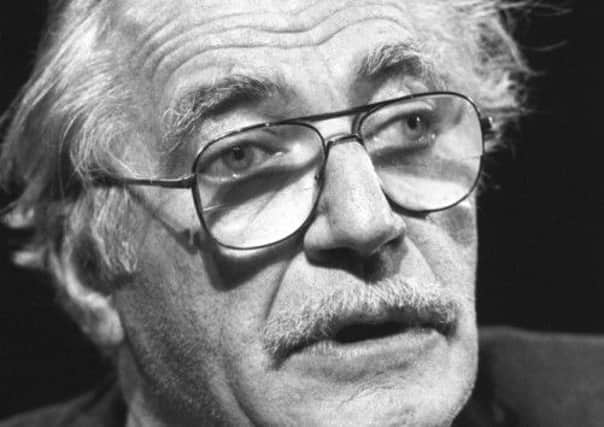Obituary: Nigel Davenport, actor


For half a century Nigel Davenport was an imposing figure on stage and screen. A tall man with a growly voice, and often a neatly trimmed moustache, Davenport had the bearing and presence of a military officer and was well suited to playing powerful and intimidating characters, aristocrats and historical figures, either heroes or villains.
He had major roles in two Best Picture Oscar-winners, portraying Thomas More’s ally the Duke of Norfolk in A Man for All Seasons in 1966 and Lord Birkenhead, a key figure in the 1924 Paris Olympics Games, in Chariots of Fire in 1981. Chariots of Fire told the story of the rivalry between Harold Abrahams and the Scot Eric Liddell and much of it was filmed in Scotland.
Advertisement
Hide AdAdvertisement
Hide AdAlthough Davenport was seen mainly in supporting roles, he co-starred with Vanessa Redgrave in the 1971 film Mary, Queen of Scots, playing the queen’s rash third husband Lord Bothwell.
He also appeared regularly on television and had recurring roles in the late 1980s as a nasty businessman in Howards’ Way, the BBC’s popular drama series set among the yachting set on the south coast of England, and in the early 1990s as a property developer and racehorse owner in Trainer.
Born Arthur Nigel Davenport in Cambridge in 1928, he came from a military background. His father was a Cambridge bursar who had won an MC in the First World War and his great-uncle a VC in the Boer Wars.
He studied English at Oxford University, where he became involved in the dramatic society and decided to try to make a living as a professional actor.
He had a “lazy eye” and had an operation in the early 1950s, but he was left with a slight squint and little vision in his right eye. However, this merely seemed to intensify his gaze and disconcert others, adding to his presence, particularly in later years on screen.
He worked with various different theatre companies in England, including the English Stage Company at the Royal Court and Joan Littlewood’s Theatre Workshop.
He played the mother’s boyfriend in Littlewood’s original 1958 production of Shelagh Delaney’s landmark play A Taste of Honey and reprised the role both in the West End and on Broadway.
During the 1950s and early 1960s Davenport appeared in small parts in a string of television series and one-off dramas. He managed to play seven different roles in seven different episodes of The Adventures of Robin Hood and he was in the films Look Back in Anger and Peeping Tom.
Advertisement
Hide AdAdvertisement
Hide AdBut A Man for All Seasons gave him a much more substantial role as the plain-talking Duke of Norfolk, alongside Paul Scofield, giving an Oscar-winning performance as Henry VIII’s principled, but doomed Chanceller Thomas More.
After A Man for All Seasons, there was a brief period in the late 1960s and early 1970s when Davenport was getting leading or co-starring roles in films.
In Play Dirty he and Michael Caine lead a group of convicts behind enemy lines in North Africa.
There were obvious similarities to The Dirty Dozen, though Play Dirty ended with a famously downbeat scene in which Davenport and Caine are dressed in German uniforms, indicate that they want to surrender to the British and are then machine-gunned before they have a chance to speak.
It was not a big hit at the time, but was shown at the Edinburgh Film Festival in 1994 and is now regarded as a minor classic.
For a short while Davenport seemed almost ubiquitous in British films, turning up in The Royal Hunt of the Sun, The Virgin Soldiers, The Mind of Mr Soames, No Blade of Grass, The Last Valley, Villain and Living Free, the sequel to Born Free, in which he and Susan Hampshire took over the roles of naturalists George and Joy Adamson.
As the 1970s went on he gravitated more towards television. He was Arthur Conan Doyle in the mini-series The Edwardians, Van Helsing to Jack Palance’s Dracula, and King George III in Prince Regent.
Throughout his career Davenport continued to work in theatre, appearing in Jonathan Miller’s production of The Three Sisters at the King’s Theatre in Glasgow in 1976 and in Alan Bennett’s The Old Country at the King’s in Edinburgh in 1989. His other notable theatre roles include the title role in a touring production of King Lear.
Advertisement
Hide AdAdvertisement
Hide AdIn the 1980s and early 1990s, he was president of Equity, the actor’s union, in which he was seen as a moderate standing up to the far-left, which was led, ironically, by his former co-star Vanessa Redgrave.
He was a Labour supporter, before switching allegiance and backing Thatcher, then he backed the SDP and then switched back to Labour once more.
Davenport yearned for life in the country and had farmhouses in Suffolk and Ibiza, though latterly he lived in Gloucestershire.
He was married twice. His second wife was the actress Maria Aitken. Both marriages ended in divorce.
He is survived by three children, including Jack Davenport, the English actor best known for This Life and as the naval officer Norrington in the Pirates of the Caribbean films.